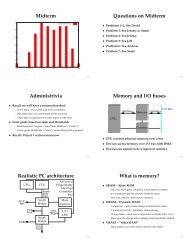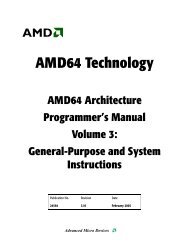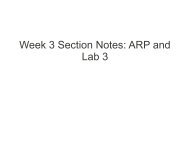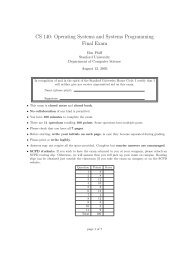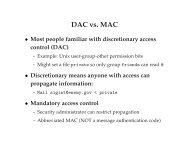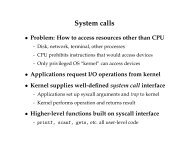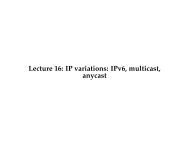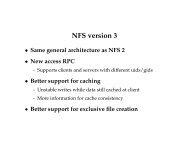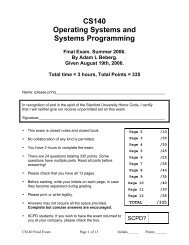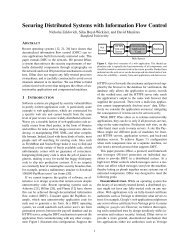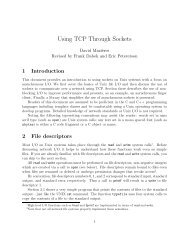Midterm Exam - Stanford Secure Computer Systems Group
Midterm Exam - Stanford Secure Computer Systems Group
Midterm Exam - Stanford Secure Computer Systems Group
You also want an ePaper? Increase the reach of your titles
YUMPU automatically turns print PDFs into web optimized ePapers that Google loves.
– p. 1/16<br />
<strong>Midterm</strong> <strong>Exam</strong><br />
• Reminder: <strong>Midterm</strong> <strong>Exam</strong> next Tuesday 10/31<br />
• Open book, open note, but not open laptop<br />
- Bring printouts of all papers read so far<br />
- Feel free to bring printouts of lecture materials<br />
• <strong>Exam</strong> will be here in classroom (Skilling 191)<br />
• Please take exam here at <strong>Stanford</strong> if possible<br />
- SCPD students can come to <strong>Stanford</strong> (free parking after 4pm)<br />
- If you can’t take it here person, please email<br />
×¾¼¹×Ø×׺×ØÒÓÖºÙto make arrangements<br />
- You should already have heard from us, so definitely email if<br />
you haven’t and you can’t take exam at <strong>Stanford</strong><br />
• SENSYS students let us know who can proctor exam
– p. 2/16<br />
Back in the 80s. . .<br />
• Disks spin at 3,600 RPM<br />
- 17 ms/Rotation (vs. 4 ms on fastest disks today)<br />
• Fixed # sectors/track (no zoning)<br />
• Head switching free ()<br />
• Requests issued one at a time<br />
- No caching in disks<br />
- Head must pass over sector after getting a read<br />
- By the time OS issues next request, too late for next sector<br />
• Slower CPUs, memory<br />
- Noticeable cost for block allocation algorithms
– p. 3/16<br />
Original Unix file system<br />
• Each FS breaks partition into three regions:<br />
- Superblock (parameters of file system, free ptr)<br />
- Inodes – type/mode/size + ptr to data blocks<br />
- File and directory data blocks<br />
• All data blocks 512 bytes<br />
• Free blocks kept in a linked list
– p. 4/16<br />
Inodes<br />
inode<br />
contents<br />
directory<br />
.<br />
name<br />
i-number<br />
.<br />
metadata<br />
data ptr<br />
data ptr<br />
.<br />
indirect ptr<br />
double indir<br />
.<br />
...<br />
indirect<br />
block<br />
data ptr<br />
data ptr<br />
.<br />
data<br />
data<br />
.<br />
data<br />
data<br />
.
– p. 5/16<br />
Problems with original FS<br />
• FS never transfers more than 512 bytes/disk access<br />
• After a while, allocation essentially random<br />
- Requires a random seek every 512 bytes of file data<br />
• Inodes far from both directory data and file data<br />
• Within a directory, inodes not near each other<br />
• Usability problems:<br />
- File names limited to 14 characters<br />
- No way to update file atomically & guarantee existence after<br />
crash
– p. 6/16<br />
Fast file system<br />
• New block size must be at least 4K<br />
- To avoid wasting space, use “fragments” for ends of files<br />
• Cylinder groups spread inodes around disk<br />
• Bitmaps replace free list<br />
• FS reserves space to improve allocation<br />
- Tunable parameter, default 10%<br />
- Only superuser can use space when over 90% full
– p. 7/16<br />
FFS superblock<br />
• Contains file system parameters<br />
- Disk characteristics, block size, CG info<br />
- Information necessary to get inode given i-number<br />
• Replicated once per cylinder group<br />
- At shifting offsets, so as to span multiple platters<br />
- Contains magic to find replicas if 1st superblock dies<br />
• Contains non-replicated “summary info”<br />
- # blocks, fragments, inodes, directories in FS<br />
- Flag stating if FS was cleanly unmounted
– p. 8/16<br />
Cylinder groups<br />
• <strong>Group</strong>s related inodes and their data<br />
• Contains a number of inodes (set when FS created)<br />
- Default one inode per 2K data<br />
• Contains file and directory blocks<br />
• Contains bookkeeping information<br />
- Block map – bit map of available fragments<br />
- Summary info within CG – # free inodes, blocks/frags, files,<br />
directories<br />
- # free blocks by rotational position (8 positions)
– p. 9/16<br />
Inode allocation<br />
• Allocate inodes in same CG as directory if possible<br />
• New directories put in new cylinder groups<br />
- Consider CGs with greater than average # free inodes<br />
- Chose CG with smallest # directories<br />
• Within CG, inodes allocated randomly (next free)<br />
- Would like related inodes as close as possible<br />
- OK, because one CG doesn’t have that many inodes
– p. 10/16<br />
Fragment allocation<br />
• Allocate space when user writes beyond end of file<br />
• Want last block to be a fragment if not full-size<br />
- If already a fragment, may contain space for write – done<br />
- Else, must deallocate any existing fragment, allocate new<br />
field×ØÐ×Þ<br />
- (Partial) soution: new×ØØstruct<br />
- Tells applications file system block size<br />
• If no appropriate free fragments, break full block<br />
• Problem: Slow for many small writes<br />
- stdio library can buffer this much data
– p. 11/16<br />
Block allocation<br />
• Try to optimize for sequential access<br />
- If available, use rotationally close block in same cylinder<br />
- Otherwise, use block in same CG<br />
- If CG totally full, find other CG with quadratic hashing<br />
- Otherwise, search all CGs for some free space<br />
• Problem: Don’t want one file filling up whole CG<br />
- Otherwise other inodes will have data far away<br />
• Solution: Break big files over many CGs<br />
- But large extents in each CGs, so sequential access doesn’t<br />
require many seeks
– p. 12/16<br />
Directories<br />
• Inodes like files, but with different type bits<br />
• Contents considered as 512-byte chunks<br />
• Each chunk hasÖØstructure(s) with:<br />
- 32-bit inumber<br />
- 16-bit size of directory entry<br />
- 8-bit file type (NEW)<br />
- 8-bit length of file name<br />
• Coalesce when deleting<br />
- If firstÖØin<br />
chunk<br />
deleted, set inumber = 0<br />
• Periodically compact directory chunks
– p. 13/16<br />
Updating FFS for the 90s<br />
• No longer want to assume rotational delay<br />
- With disk caches, want data contiguously allocated<br />
• Solution: Cluster writes<br />
- FS delays writing a block back to get more blocks<br />
- Accumulates blocks into 64K clusters, written at once<br />
• Allocation of clusters similar to fragments/blocks<br />
- Summary info<br />
- Cluster map has one bit for each 64K if all free<br />
• Also read in 64K chunks when doing read ahead
– p. 14/16<br />
Dealing with crashes<br />
• Suppose all data written asynchronously<br />
• Delete/truncate a file, append to other file, crash<br />
- New file may reuse block from old<br />
- Old inode may not be updated<br />
- Cross-allocation!<br />
- Often inode with older mtime wrong, but can’t be sure<br />
• Append to file, allocate indirect block, crash<br />
- Inode points to indirect block<br />
- But indirect block may contain garbage
– p. 15/16<br />
Ordering of updates<br />
• Must be careful about order of updates<br />
- Write new inode to disk before directory entry<br />
- Remove directory name before deallocating inode<br />
- Write cleared inode to disk before updating CG free map<br />
• Solution: Many metadata updates syncrhonous<br />
- Of course, this hurts performance<br />
- E.g., untar much slower than disk b/w<br />
• Note: Cannot update buffers on the disk queue
– p. 16/16<br />
Fixing corruption – fsck<br />
• Summary info usually bad after crash<br />
- Scan to check free block map, block/inode counts<br />
• System may have corrupt inodes (not simple crash)<br />
- Bad block numbers, cross-allocation, etc.<br />
- Do sanity check, clear inodes with garbage<br />
toÐÓ×Ø·ÓÙÒ<br />
- Count number of directory entries verify link count, if no<br />
entries but count ≠ 0, move<br />
- Make sure size and used data counts match blocks<br />
• Fields in inodes may be wrong<br />
• Directories may be bad<br />
- Holes illegal,ºandººmust be valid, . . .<br />
- All directories must be reachable



